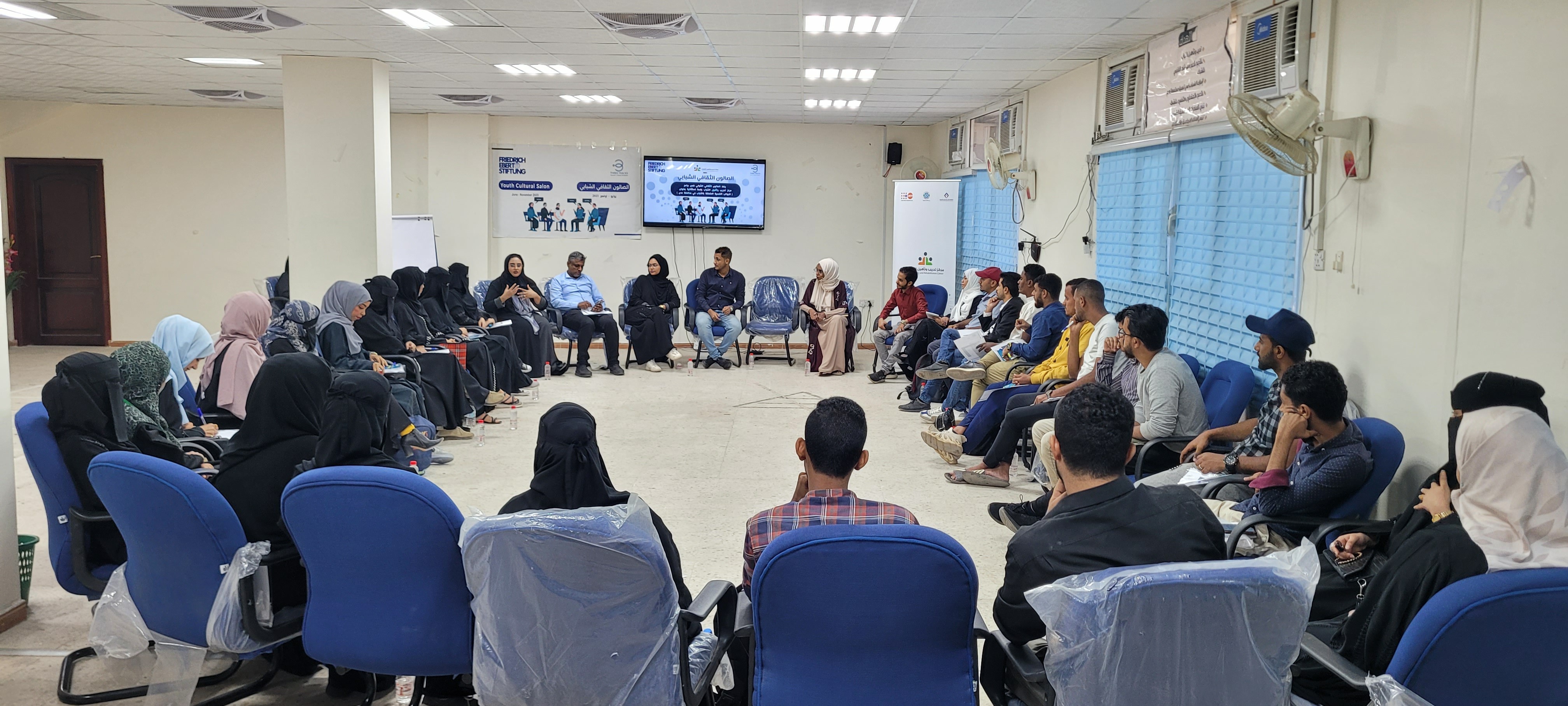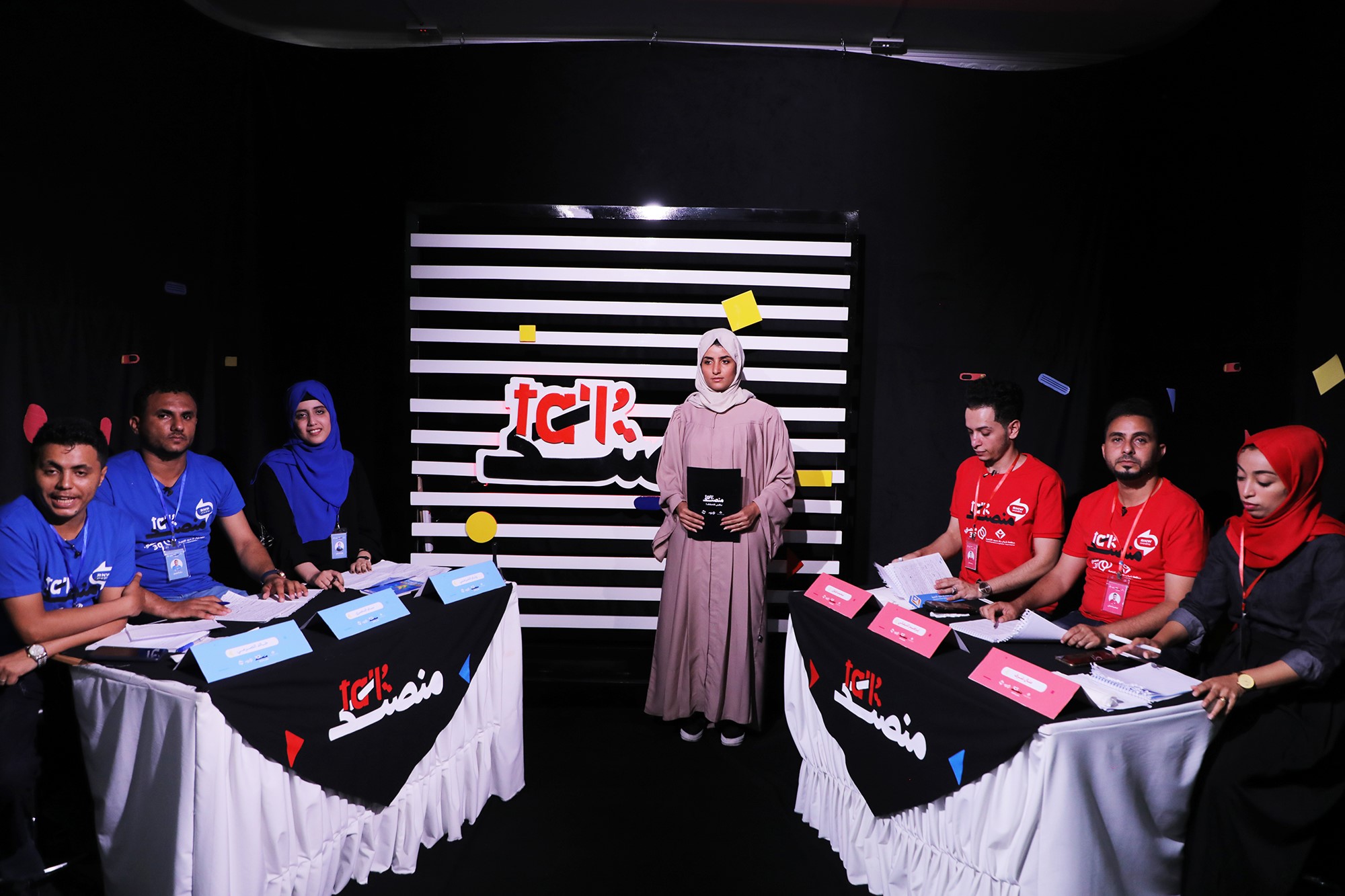From Scratch to the Pioneer
‘Member Stories’ is a series of articles issued by the Civil Society Platform for Peacebuilding and Statebuilding (CSPPS) in direct collaboration with its members, featuring the work of its members.
Curious to find out more about our colleagues in Yemen? We talked and worked with Maged Alkholidy, Abdullah Alsalami and Elham Alqershi from Youth Without Borders Organisation for Development (YWBOD). They explain the situation in Yemen, and their incredible efforts in promoting women's and youth’s capacity strengthening and empowerment in the country.
The context in Yemen
The ongoing conflict in Yemen has deeply impacted the country's humanitarian, social, economic, and political landscape. Yemeni youth have been particularly affected across multiple dimensions—socially, psychologically, economically and politically. Their access to education, employment, and meaningful participation in public life has been severely limited. In addition, the ongoing conflict has significantly marginalised young men and women, excluding them from leadership roles and decision-making processes. This systemic exclusion undermines their ability to articulate their needs, influence policies, and contribute effectively to governance and peacebuilding. As a result, integrating youth into society and fostering a culture of peace among them has become a critical priority for civil society organisations. In this context, YWBOD's efforts aim to empower young people and encourage their active and constructive engagement in rebuilding their communities.
An Introduction to YWBOD
Youth Without Borders Organisation for Development (YWBOD) is a civil society organisation that started in 2013 and focuses on advocating for youth empowerment in social and economic fields in Yemen. The organisation gained more importance since the conflict intensified in Yemen in 2015. Currently, YWBOD has around 60-70 staff members working in offices located in three main cities, and a presence in other parts of the country. YWBOD has implemented between 30 and 40 projects so far, mostly focusing on empowering women and youth, on the capacity of local authorities to implement security and the stability of societies. To do so, the organisation is working closely with state institutions, local authorities, social leaders and civil society organisations.
Connecting grassroots to national dialogue
On the national and local level, throughout the years, YWBOD has demonstrated robust technical capacities, alongside thorough and very effective outreach to local communities, local and national authorities, CSOs, and CSO networks and alliances. YWBOD also played an active role in national and international civil society platforms. For example, YWBOD is a member of the Civil Alliance for Peace (CAP), which advocates for inclusive and locally led peace processes, and the Civil Voices Alliance, which connects grassroots actors to national dialogue efforts. On a global level, YWBOD engages with networks such as the United Network of Young Peacebuilders (UNOY) and the Civil Society Platform for Peacebuilding and State-building (CSPPS), amplifying Yemeni youth perspectives in global forums. These partnerships underscore YWBOD’s commitment to meaningful collaboration and strategic advocacy across all levels.
The Sharakat Project for Youth Inclusion
The Sharakat project (Towards Inclusion of Young Men and Women in Decision Making in Yemen) is an initiative funded by the Dutch Embassy in Yemen that aims to institutionalise youth engagement in municipalities, local authorities, and national-level ministries. It has been implemented in partnership with the Civil Alliance of Peace (CAP), the Youth, Peace and Security Pact (YPS pact Yemen), local CSOs, youth initiatives, local authorities and institutions. Through the project, YWBOD managed to build the capacity for more than 202 people, including 72 young officials in the local authorities of the three governorates.
This project includes two distinct phases. In the first one, about 60 young participants (men and women) were appointed to decision-making positions in the local government, and 83 young men and women were engaged in local decision-making positions, including participating in consultations with the government. Through this project, YWBOD managed to enhance the advocacy capacity for youth and CSOs. The overall project activities built the capacities and engaged 11 civil society actors (CSOs and youth and women initiatives) and established an informal coalition of these actors to work collectively towards further engagement of youth in decision-making. The main tasks include developing policy papers, advocating for youth issues, and dialogues with various stakeholders and authorities. With this, CSOs obtain their partnerships and have a stronger role without the guidance of YWBOD.
As a result of the first phase, 60 young men and women got affiliated with seven political parties in the three target governorates, and 44 young men and women in 22 Ministries. The organisation’s endeavour is to deepen the capacities of young men and women while fostering broader exposure and experiential learning in decision-making domains. Below, you can read from the beneficiaries of the project. 
The project has been met with success and has become a trend in Yemen for youth engagement. Sharakat is known in Yemen and has become a model and a great example for strengthening youth engagement. This project has also brought civil society close to the authorities, and has given space to youth who have been ignored in the past because of their involvement in the conflicts.
The second phase of the project seeks to sustain the momentum generated by the first phase and to leverage the renewed interest of local authorities in collaborating with youth and women.
“The advocacy campaigns and policy papers produced by the Sharakat Project have played an important role in bringing youth voices to decision-makers, and I believe they have had an impact – albeit a relative one – on decision-makers and changed their beliefs about engaging youth and appointing them to leadership roles.”
-Deputy Director of the Youth and Sports Office – Taiz
“The training was a qualitative shift in my thinking and the thinking of the participating youth. Before participating in the training, we were carrying out our routine tasks, believing that this was all we had to offer and that our roles ended there. However, we have now emerged from it with a firm conviction that our roles do not end there, but rather expand and continue, reaching decision-making and effective participation in the government”
-Participants in Capacity building for youth officials in the ministry
Youth Services Centers - Creating a Safe Space
Due to the context of Yemen’s ongoing conflict, the absence of safe spaces, market-driven skills, and leadership opportunities has left many young people feeling disenfranchised and unable to participate meaningfully in society, and their needs to empower them to take ownership of their futures have also not been addressed. In light of this, Youth Services Centers started in 2020 and aim to provide a safe space for youth and women who are dealing with trauma and gender-based violence. This project established centres to create a safe space for young men and women where they have capacity building, legal support, art activities, psychological support and sport facilities. Year after year, the project is expanding, for instance, by including economic empowerment. Over the years, Youth Centers have emerged as crucial safe spaces that address these gaps by offering structured programmes and essential services such as capacity-building, leadership development, psychosocial support, reproductive health services, and opportunities for community engagement.
The project started in Taiz, in Aden, and another centre in Hadhramaut recently opened. Through these facilities, we have been reaching out to more than 23,692 young men and women who participated in the centre’s activities. 
The success of the Centers has been significantly supported by strong partnerships with 19 government entities, 16 companies from the private sector and 16 civil societies.
As mentioned by Maghed Alkholidy, the founder of YWBOD; “ If you go to the private sector, you can find people who are targeted by on-the-job training in the centers in which we pay people for 3-4 months, and then they get jobs. The centre is one of the things we are proud of, as we have been operating for 5 years. Despite budget cuts, we are resisting and continuing our work. We organise sports activities, and see how this changes the mood of people. The project is funded by UNFPA, but this year, because of the budget cuts, we are struggling to sustain the activities of the centers”
"It can be said that the project had a positive impact on decision-makers at the local and national levels through the great interaction of decision-makers with the project activities, including the local and national advocacy campaign and the ongoing cooperation with the issue of involving youth in decision-making, and issuing decisions to appoint young men and women in decision-making positions, all of which are indicators of the sustainability of the project."
-Head of one of the targeted CSOs in the project
"Before our participation in the Sharakat project, we avoided participating in political activities with any party. Sharakat has achieved for us strong relationships with various components of the local authority and political parties in the governorate, and we now have direct channels of communication with them"
- Head of targeted Youth Initiative in project
Challenges
In the current context, we are faced with several challenges. Securing funding has become increasingly challenging, especially with the recent budget cuts impacting the resources available for CSOs. The uncertainties in both the global and national landscape further complicate planning and the implementation of activities, making it difficult for CSOs to operate effectively.
Ongoing conflict in the country has added to the strain by creating significant economic challenges that affect CSOs, but also the communities they serve. As a result, organisational priorities are constantly shifting. Whilst many CSOs aim to address long-term development goals, the pressing humanitarian crisis and the urgent need for economic empowerment are pushing projects into more reactive modes.
Additionally, aligning with governmental authorities has proven to be difficult. Even when project approvals are granted, the priorities set by authorities often differ from those identified by CSOs, leading to misalignment in implementation. Furthermore, the bureaucratic procedures to implement projects and activities are often unclear and time-consuming, causing delays and reducing the overall impact of the projects.
“We feel that youth are change makers and if they are engaged well and empowered well, there is a bright future, this is the reason we work with them.”
